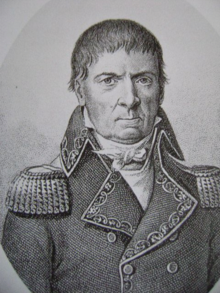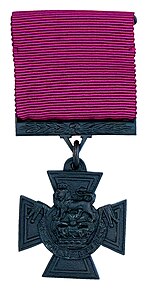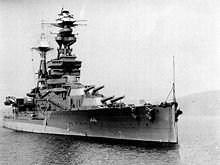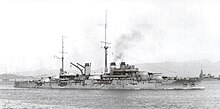Portal:History
The History Portal

Historia by Nikolaos Gyzis
History is the systematic study of the past. As an academic discipline, it analyzes and interprets evidence to construct narratives about what happened and explain why it happened, focusing primarily on the human past. Some theorists categorize history as a social science, while others see it as part of the humanities or consider it a hybrid discipline. Similar debates surround the purpose of history, for example, whether its main aim is theoretical, to uncover the truth, or practical, to learn lessons from the past. In a slightly different sense, the term history refers not to an academic field but to the past itself or to individual texts about the past.
History is a broad discipline encompassing many branches. Some focus on specific time periods, such as ancient history, while others concentrate on particular geographic regions, such as the history of Africa. Thematic categorizations include political history, social history, and economic history. Branches associated with specific research methods are quantitative history, comparative history, and oral history.
Historical research relies on primary and secondary sources to reconstruct past events and validate interpretations. Source criticism is used to evaluate these sources, assessing their authenticity, content, and reliability. Historians integrate the perspectives of several individual sources to develop a coherent narrative. Different schools of thought, such as positivism, the Annales school, Marxism, and postmodernism, have distinct methodological implications.
History emerged as a field of inquiry in the ancient period to replace myth-infused narratives, with influential early traditions originating in Greece, China, and later also in the Islamic world. Historical writing evolved throughout the ages and became increasingly professional, particularly during the 19th century, when a rigorous methodology and various academic institutions were established. History is related to many fields, including historiography, philosophy, education, and politics. (Full article...)
Featured picture
Did you know (auto generated)

- ... that Art Rooney Jr. presided over what one Pro Football Hall of Fame selector described as "the best drafting run in NFL history"?
- ... that interviews collected for a Boston College oral history project were used in two murder trials?
- ... that American Colossus is a biography of a man who was "the most famous sportsman in the world" and "the most forgotten great athlete in American history"?
- ... that at the age of 28, Mason Morelli became the first player in Vegas Golden Knights franchise history to record two points in their National Hockey League debut game?
- ... that the Harlem Park Three were awarded US$48 million, the largest sum in Baltimore history, after being falsely imprisoned for murder?
- ... that the Al Qarara Cultural Museum, housed in a former grain silo, contained 6000 years of history?

Jean-François Marie de Surville (18 January 1717 – 8 April 1770) was a merchant captain with the French East India Company. He commanded a voyage of exploration to the Pacific in 1769–70.
Born in Brittany, France, Surville joined the French East India Company in 1727 at the age of 10. For the next several years he sailed on voyages in Indian and Chinese waters. In 1740 he joined the French Navy; he fought in the War of the Austrian Succession and the Seven Years' War, twice becoming a prisoner of war. After his military career he rejoined the French East India Company. In 1769, in command of Saint Jean-Baptiste, he sailed from India on an expedition to the Pacific looking for trading opportunities. He explored the seas around the Solomon Islands and New Zealand before proceeding eastward across the South Pacific towards South America. Part of his route around New Zealand overlapped that of James Cook in Endeavour, which had preceded him by only a few days. De Surville drowned off the coast of Peru on 8 April 1770 while seeking help for his scurvy-afflicted crew. (Full article...)
On this day
February 9: Feast day of Apollonia in Roman Catholicism and Eastern Orthodoxy
- 1825 – After no candidate received a majority of electoral votes in the previous year's presidential election, the United States House of Representatives chose John Quincy Adams (pictured) as president in a contingent election.
- 1945 – World War II: Allied aircraft unsuccessfully attacked a German destroyer in Førde Fjord, Norway.
- 1950 – U.S. senator Joseph McCarthy accused 205 employees of the State Department of being communists, sparking a period of strong anti-communist sentiment known as McCarthyism.
- 1975 – The spacecraft and crew of the Soviet Soyuz 17 mission returned to earth after 29 days in orbit at the Salyut 4 station.
- 2020 – Japanese figure skater Yuzuru Hanyu won the Four Continents Championships to become the only man to complete a Super Slam.
- Adele Spitzeder (b. 1832)
- Ella D. Barrier (d. 1945)
- Vladimir Guerrero (b. 1975)
- Margareta Hallin (d. 2020)
Selected quote
Even as the fingers of the two hands are equal, so are human beings equal to one another. No one has any right, nor any preference to claim over another. You are brothers.
— Muhammad, 7th century Islamic prophet
Related portals
More Did you know...
- ... that the Japanese aircraft carrier Amagi (wreck pictured) capsized on 29 July 1945 as a result of cumulative damage inflicted by American airstrikes on 24 and 28 July?
- ... that Scandinavian influence in Scotland, still evident today, was probably at its height during the time of Thorfinn the Mighty?
- ... that, after the 2003 invasion of Iraq, the Bassetki statue, which is more than 4,200 years old, was found in a cesspool?
- ... that in medieval art, angels were often depicted wearing feather tights?
- ... that 49% of German military losses happened in the last 10 months of the Second World War in Europe?
- ... that Joshua L. Goldberg, the first rabbi to serve as a World War II U.S. navy chaplain, was a Russian army deserter?
- ... that Richard Nixon chose the Wilson desk as his Oval Office desk because he believed it was used by Woodrow Wilson, informed that it was used by Henry Wilson, Vice President under Ulysses S. Grant, but actually bought by Garret Augustus Hobart, 24th Vice President of the United States under President William McKinley?
- ... that some of the nominally silver Roman coins from the Bredon Hill Hoard only have a 1% silver content?
Topics
Categories

History • By period • By region • By topic • By ethnic group • Historiography • Archaeology • Books • Maps • Images • Magazines • Organizations • Fictional • Museums • Pseudohistory • Stubs • Timelines • Chronology • People • Wikipedia historians
WikiProjects
![]() WikiProject History •
Ancient Near East • Australian History • Classical Greece and Rome • Dacia • Former countries • History of Canada • Chinese history • European history • Heraldry and vexillology • Indian history • Jewish history • Medieval Scotland • Mesoamerica • Military history • Middle Ages • History of Science
WikiProject History •
Ancient Near East • Australian History • Classical Greece and Rome • Dacia • Former countries • History of Canada • Chinese history • European history • Heraldry and vexillology • Indian history • Jewish history • Medieval Scotland • Mesoamerica • Military history • Middle Ages • History of Science
WikiProject Time • Days of the Year • Years
WikiProject Biography • Composers • Political figures • Saints • United States Presidents
Things you can do
 |
Here are some tasks awaiting attention:
|
Associated Wikimedia
The following Wikimedia Foundation sister projects provide more on this subject:
-
Commons
Free media repository -
Wikibooks
Free textbooks and manuals -
Wikidata
Free knowledge base -
Wikinews
Free-content news -
Wikiquote
Collection of quotations -
Wikisource
Free-content library -
Wikiversity
Free learning tools -
Wiktionary
Dictionary and thesaurus























































